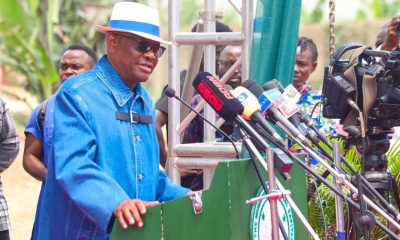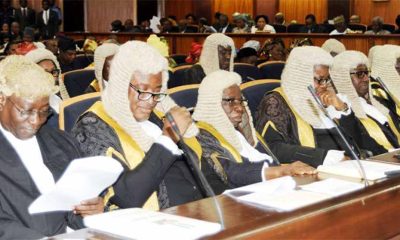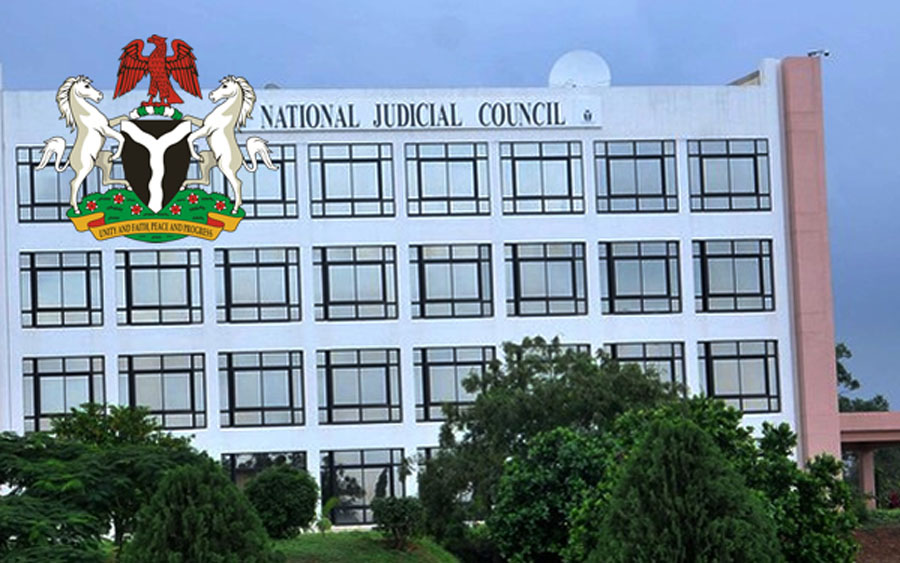News
Federal High Court with 75 judges has 128,000 pending cases – Chief Judge
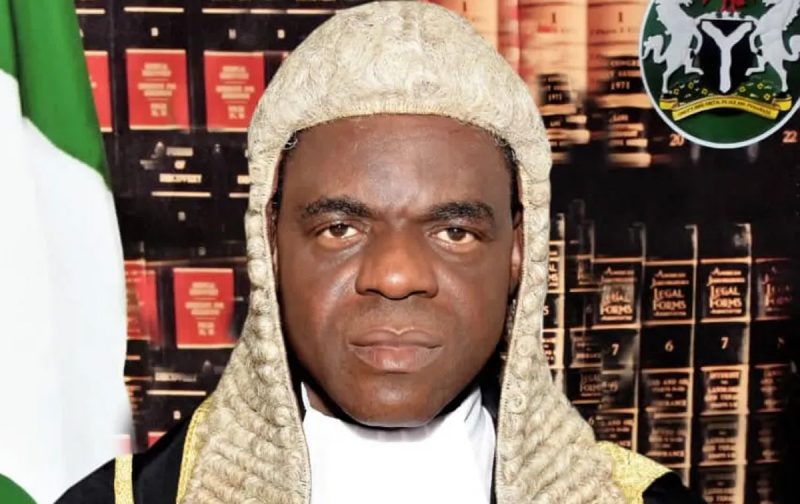
The Federal High Court currently has over 128,000 cases in its dockets across its divisions nationwide, the Chief Judge of the court, John Tsoho, said on Thursday.
With 75 judges currently on its bench, it means a judge on the average has over 1,700 cases to handle.
Mr Tsoho who spoke during the the special court session to mark the commencement of the Federal High Court’s new 2021/2022 legal year in Abuja, acknowledged how loaded judge’s dockets had become since the COVID-19 pandemic was brought under control last year.
While giving a breakdown of cases on the court’s docket, the Chief Judge said, “The 2020/2021 legal year officially closed in July, 2021.
“Within that year, (i.e September 2020 – June, 2021), a total of 8, 309 cases were filed.
“There were 40,822 civil cases; 30, 197 criminal cases; 35563 motions and 20, 258 fundamental rights enforcement applications pending at the end of the Legal Year.”
“The total number of cases disposed of during that year was 6, 915 cases; with a total of 128, 234 pending at the end of the Legal Year,” he added.
He noted that after the improvement in the control of the coronavirus, “more and more cases were filed and the dockets of the judges became enormously loaded.”
Mr Tsoho, however, assured that with the appointment of new judges almost completed, “the problems would be tackled headlong.”
He restated his “resolve to enhance effective administration of justice, welfare of judges and staff.”
To actualise the goal, he said, “several practice directions were issued to ensure seamless and robust administration of justice.”
He said despite the low budgetary allocations to the judiciary and the Federal High Court in particular, “the training and retraining of judges and staff have continued.”
Body of SANs speaks
Meanwhile, the Body of Senior Advocates of Nigeria (BOSAN) says virtually all of Nigerian states’ structures of accountability have collapsed.
It said democracy has not delivered equal opportunities for all Nigerians as no one is accountable.
A former Attorney-General of the Federation and Minister of Justice, Kanu Agabi, spoke on behalf of BOSAN at the Federal High Court event on Thursday.
Mr Agabi, a Senior Advocate of Nigeria, said judges should not be blamed for the many social ills plaguing the country.
“It is not the fault of our judges that democracy has not yielded equal opportunities for all Nigerians,” he said.
Mr Agabi queried, “What can the judiciary do when in virtually all our states the structures for accountability have been set aside and no one is accountable?”
Cautionary words for judges
Mr Agabi advised judges against becoming instrument in the hands of politicians.
“This is a time of high politics in our country,” he said, adding, “The judiciary must ensure that it does not become an instrument in the hands of politicians.”
The former AGF further said, “It will be most tragic indeed if a man’s political enemies are able to get him in court when they have been unable to get him in their political battlefields.”
Retrofitted court commissioned
The event witnessed the commissioning of the Chief Judge’s retroffited court.
Kashim Zannah, the Chief Judge of Borno State, who represented the Chief Justice of Nigeria (CJN), Tanko Muhammad, while commissioning the newly redesigned courtroom, said the National Judicial Council (NJC) had completed all four key components of the judicial information technology policy (JITPO).
JITPO is the NJC’s policy aimed at laying a “nationwide soft infrastructure to enable the emergence of a justice sector electronic ecosystem to automate and enhance justice delivery by leveraging technology,” Mr Zannah explained.
“This court is one of the nine courtrooms of the federal courts retrofitted by the NJC across the nation,” he said, while demonstrating the virtual connectivity of the CJ’s retrofitted courtroom with the Kuje correctional centre in Abuja.
With the electronic gadgets installed in the courtroom, inmates at the Kuje prison can attend their trials from the detention facility, thereby eliminating the hassles that are associated with conveying defendants to court.
Several criminal cases have had to be adjourned on account of logistical issues with inmates transportation.
Mr Zannah also chairs the Judicial Information Technology Committee of the NJC, a body saddled with the responsibility of providing the technical know-how of deploying technology in conducting court proceedings in Nigeria.
Premium Times
News
Currency in circulation now N4.8tn – CBN report
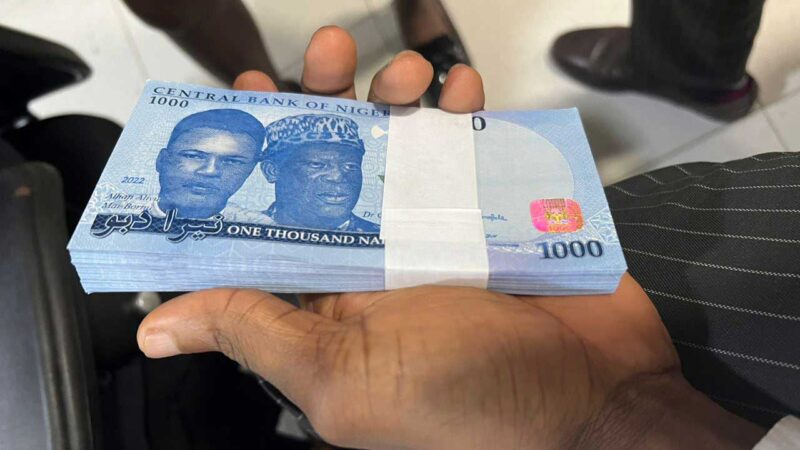
Currency in circulation now N4.8tn – CBN report
Currency in circulation has reached an all-time high of N4.8 trillion as of November 2024, recording over seven per cent increase from the previous month.
Also, currency outside banks grew significantly in the same month hitting an all-time high of N4.6 trillion from the N4.2 trillion in the month of October.
These figures were contained in the money and credit supply data from the Central Bank of Nigeria (CBN).
The currency in circulation is the amount of cash–in the form of paper notes or coins–within a country that is physically used to conduct transactions between consumers and businesses.
It represents the money that has been issued by the country’s monetary authority, minus cash that has been removed from the system.
Similarly, currency outside a bank refers to cash held by individuals, businesses and other entities that is not stored in banks.
The currency outside the bank represents about 96 per cent of the currency in circulation.
Nigerians have in recent times been facing acute cash shortage with banks limiting daily withdrawal at Automated Teller Machines (ATMs) to N20,000 irrespective of the number of accounts held by an account owner.
READ ALSO:
- Cross River man kills mother, dumps body inside well
- El-Rufai mocks Reno Omokri with throwback protest photos against Tinubu
- Warri refinery: Marketers hopeful of further petrol price drop
According to the latest data, the currency in circulation grew by seven per cent to reach 4,878,125.22 from 4,549,217.51 in October.
Currency in circulation has grown steadily in the outgoing year 2024 with over one trillion naira added to cash in circulation after starting the year with N3.65 trillion in January.
In February, the currency in circulation slightly increased to N3.69 trillion representing an increase of N43 billion or 1.18 per cent from the January figure.
March also saw an appreciable increase to N3.87 trillion while it further increased to N3.92 trillion in the following month of April.
The growth trajectory continued in May with the currency in circulation increasing slightly to N3.97 trillion, an increase of N42 billion or 1.07 per cent while it reached an all-time high of 4.04 trillion, an increase of 2.11 per cent from May.
The July figure also rose marginally with the currency in circulation settling for N4.05 trillion before growing to N4.14 trillion in August and N4.43 trillion in September and N4.5 trillion in October.
In the same vein, currency outside banks grew from N4.2 trillion in October to N4.6 trillion in November, showing increasing preference for other means of storing outside bank deposits.
Economist, Dr. Paul Alaje attributed the development to the expanding money supply, adding, “Money supply is expanding but this may not necessarily be in cash. As it is expanding, it will necessarily induce inflation. But you can’t blame the people. People must look for money. How much was bottled water last year, how much is it today? All of this will induce inflation. If you now ask, what is the cause of inflation? Is it money supply itself or a devaluation policy? It is a devaluation policy. Money supply is an offshoot. So the Central Bank is raising interest rates to actually reduce money supply but the more they try the more money supply expands.”
He stated that the floatation policy of the CBN has created inflation, adding, “It is like chasing one’s tail and I don’t know if you are going to catch it.”
Currency in circulation now N4.8tn – CBN report
News
Tinubu not telling Nigerians the truth, says Sule Lamido

Tinubu not telling Nigerians the truth, says Sule Lamido
President Bola Tinubu has been accused of not being forthright about the true state of Nigeria under his administration.
Former Jigawa State Governor and senior Peoples Democratic Party (PDP) member, Sule Lamido, made the accusation while speaking on the BBC Hausa programme Gane Mini Hanya.
Lamido criticized both Tinubu and former President Muhammadu Buhari for what he described as a lack of transparency in governance.
“Buhari’s and Tinubu’s governments are not being transparent with Nigerians unlike during the time when PDP was in power where everything was transparent and open to all Nigerians,” Lamido said.
READ ALSO:
- Odili: Fubara prevented Wike from turning Rivers to private estate
- Putin apologises over Azerbaijan plane crash reportedly shot down
- 256 terrorists, two logistics suppliers arrested in one week – DHQ
He accused the two administrations of relying on propaganda rather than providing citizens with accurate information.
Lamido also expressed concerns over President Tinubu’s recent loan requests, questioning the logic behind them. “If Nigerians are being told the truth then there is nothing wrong with that, but how would you budget N30tn, generate N50tn and then request loan when you have a surplus of N20tn,” he said, referencing last year’s budget.
He described the situation as “reckless” and “selfish,” adding, “This recklessness and clear-cut selfishness is not done anywhere in the world, but yet you find (some) Nigerians supporting it. Visit social media and see how APC is being criticised, being referred to as calamity, yet you find some protecting it.”
Tinubu not telling Nigerians the truth, says Sule Lamido
News
Nigeria Customs Service begins 2025 recruitment [How to apply]

Nigeria Customs Service begins 2025 recruitment [How to apply]
The Nigeria Customs Service (NCS) has announced the commencement of its recruitment exercise, assuring Nigerians that the process is entirely free and fair.
The agency has cautioned the public to be vigilant against scammers who may attempt to exploit unsuspecting applicants during the recruitment period.
Applications are invited for positions in the Superintendent, Inspector, and Customs Assistant cadres as part of the Service’s plan to recruit 3,927 officers in 2025.
This initiative is aimed at enhancing trade facilitation and supporting Nigeria’s economic recovery efforts.
“Our recruitment is entirely free and fair. At no stage do we charge fees. Anyone requesting payment is a scammer,” the agency emphasized, urging applicants to be wary of fraudulent schemes.
READ ALSO:
- Dangote, Tinubu, Lookman, Badenoch named among 100 most influential Africans in 2024
- Heavy security in Ilesa as ex-Osun deputy gov emerges new Owa-Obokun
- Hacker has stolen N180m from my NGO account – VeryDarkMan cries out
The NCS outlined eligibility criteria, stating that applicants must be Nigerian citizens by birth, possess a valid National Identification Number (NIN), and have no criminal record or ongoing investigations.
Academic qualifications for the three cadres are as follows:
Superintendent Cadre: A university degree or Higher National Diploma (HND) along with an NYSC discharge or exemption certificate.
Inspectorate Cadre: A National Diploma (ND) or Nigeria Certificate in Education (NCE) from an accredited institution.
Customs Assistant Cadre: At least an O’Level certificate (WAEC or NECO).
In addition to these qualifications, the NCS stressed that all applicants must be physically and mentally fit, providing evidence of medical fitness from a recognized government hospital.
Nigeria Customs Service begins 2025 recruitment [How to apply]
-

 Sports3 days ago
Sports3 days agoAnthony Joshua prostrates before Governor Abiodun during Ogun visit
-

 metro2 days ago
metro2 days agoWanted terrorist commander, Bello Turji, a dead man walking – DHQ
-

 metro2 days ago
metro2 days agoNigeria on life support when Tinubu took office – Akpabio
-

 metro2 days ago
metro2 days agoFour countries that won’t celebrate New Year
-
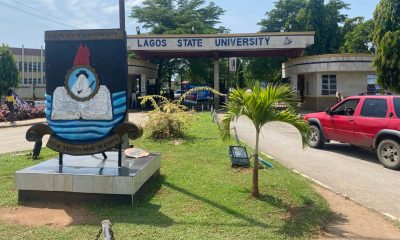
 metro3 days ago
metro3 days agoLASU don accuses Ikeja Electric of extortion, petitions FCCPC
-

 metro11 hours ago
metro11 hours ago‘Deepen Shariah knowledge to curb misinformation’
-

 metro3 days ago
metro3 days agoN180m not missing from my account, it was all a plan – Verydarkman
-

 metro3 days ago
metro3 days agoTinubu reveals Buhari’s role in commencement of Warri refinery operation



